|
Please Visit One of the Companies Helping to Bring You the Resource Center!
 |
|
The Sardine
Wrapped Kwikfish (or flatfish)
Just in time
for the peak of salmon season, we bring a little help to those unfamiliar
with setting up a kwikfish (or flatfish, essentially the same, with a
little different action) with a wrap.
An extremely effective
salmon lure ... for both spring and fall fish in Washington and throughout
our Alaska summer fishery ... this is one of the staple rigs of most
guides.
You can follow the instructions and photos below to learn how to
wrap the plug, or if you wish, you can download a video of Bob wrapping a
plug by clicking here and visiting our videos
section.
We
prefer to use sardines to wrap my plugs with, although herring or
anchovies also work. Be sure to keep the baitfish as cold as possible (we
like them partially frozen) to keep the meat firm and make this as easy as
possible
|
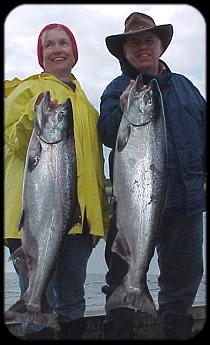
Sardine-wrapped kwikfish accounted for this pair of
Kasilof River, Alaska king salmon. |
|
Your first step is to take
a fillet off the side of the sardine as we are doing
in this picture.
The process is simple, make
a cut behind the gill plate, rotate the knife towards the tail and cut
along the backbone.
|
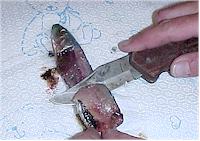 |
|
Your
next step is to trim the fillet. Ideally, we like the fillet about 3/4 of
the plugs width and about 1/2 the length of the plug. Keep the edges as
neat as possible and try to keep a consistent thickness to the finished
fillet by trimming more from one side or another.
Do keep in mind that not only does this wrap add scent to
the plug, it also slows down the wobble a little ... a characteristic that
the salmon (especially kings) seem to prefer. So a little tiny wrap isn't
going to do you a lot of good!
|
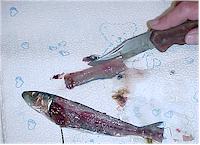 |
|
Your
next step is to split the trimmed fillet down the middle for about 3/4 of
the length of the fillet. If you trimmed neatly, the mid-point will often
be distinguished by a dark line in the fillet, but this line is not always
the true center line of the fillet, so pay attention. |
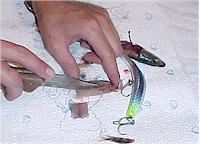 |
|
Your finished trimmed fillet will look like this ... now
comes the next step, actually wrapping the fillet onto the plug. |
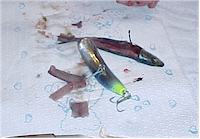 |
|
Place
the fillet onto the belly of the plug by sliding the slit down over the
belly hook eye. You want the fillet to be just about centered, or perhaps
a little toward the tail end along the length of the plug before you
begin. |
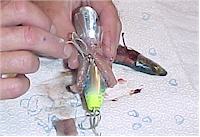 |
|
To
attach the fillet to the plug, we like to use a product called Magic
Thread ... although some people use rubber bands, transparent thread, or
light mono. Simply start wrapping the thread around the plug while you hold
the fillet in place. We think it is easier to start from the end
which was split (the tail of the plug in this case), but do whatever you
feel comfortable with. Make sure to keep the treble hook away from the end
of the plug that you are wrapping so that you don't catch the thread on
the hook. |
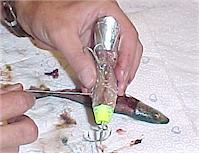 |
|
Continue
wrapping forward ... we place about twenty wraps around the fillet on my
plug, but seen others use less with success. As you pass the belly eye
to which the front hook is attached, flip the hook back toward the tail
and continue wrapping forward until the entire fillet has been securely
attached to the plug. |
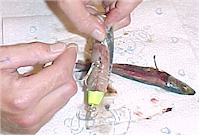 |
|
When
you finish wrapping forward, wrap back toward the tail again (wraps not so
tightly spaced this time) and throw in a few half-hitches and pull snugly
... this is where Magic Thread works so well ... you can simply break it
off in most instances, or trim whatever tag end you have with a knife. |
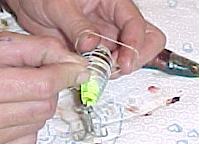 |
|
There
you have it ... the finished wrap. Remember, you can download a video of
the process by clicking here. |
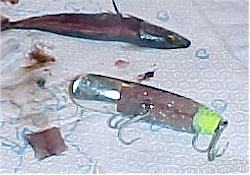 |
|
One final step before you run this setup out in front of
waiting fish: you need to tune the plug. Place the lure in the water and
make sure that it swims in a straight line. If it veers one direction or
another, ever so slightly twist the screw eye (clockwise to make the lure
swim more to the left and vice-versa) to which the plug snap is attached
until the plug swims in one spot without veering to one side or another.
This is a CRITICAL step and don't ever skip it!
Run 'em out and wait for that big take-down!
|
|
